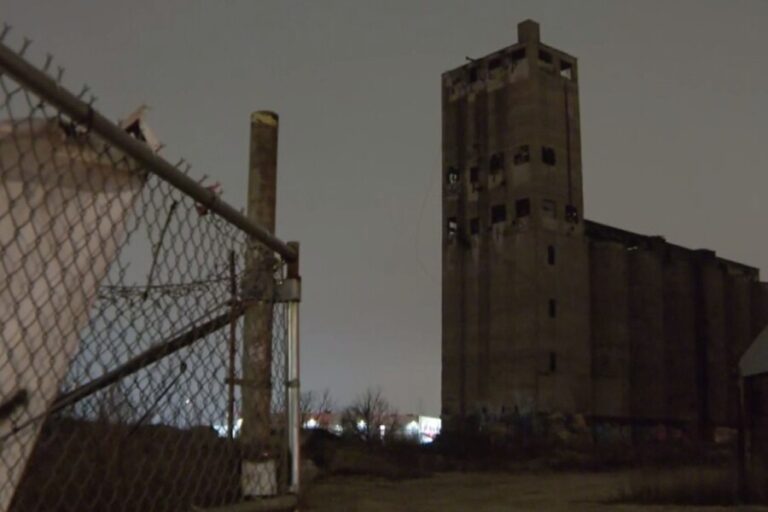Demolition of the historic Damen Silos, a towering relic of Chicago’s industrial past, is scheduled to begin Monday, July 15, following the city’s approval of local permits last week, despite years of resistance from preservationists and community advocates. The iconic structures, long abandoned but deeply symbolic of the city’s once-dominant grain industry, are set to be razed by their current owner, Michael Tadin Jr.
A Vanishing Monument to Chicago’s Grain Legacy
Standing sentinel along the Stevenson Expressway at 2860 S. Damen Ave., the silos have loomed over the city’s Southwest Side since 1906. Originally built by the Topeka & Santa Fe Railroad, the Damen Silos served as a vital hub for grain storage and transportation, emblematic of Chicago’s turn-of-the-century status as a national agricultural powerhouse. While the site’s grain-handling roots stretch back even further into the 19th century, the current configuration of silos and their adjacent workhouse rose after a destructive explosion and fire in 1932.
That same vulnerability to industrial hazards proved terminal decades later. A second, more severe explosion in 1977 forced the facility to close permanently. Since then, the 23-acre site has sat idle — a haunting but photogenic canvas for urban explorers, graffiti artists, and nostalgic Chicagoans.
The Battle to Preserve a Piece of History
For years, grassroots campaigns and preservationist organizations, including Landmarks Illinois and Preservation Chicago, have argued that the Damen Silos represent more than industrial decay — they are historic markers worthy of reuse, not removal. Advocates pushed for the transformation of the abandoned structures into community-oriented spaces such as parks, event venues, or cultural landmarks, drawing comparisons to the successful repurposing of the nearby Salt Shed — another formerly industrial site turned into a music and arts venue.
“This is a loss for the community, for architectural history, and for Chicago’s industrial legacy,” said one preservation advocate, who expressed frustration that the city moved forward with demolition permits without requiring a public redevelopment plan.
Despite these efforts, ownership and control have remained the decisive factor. In 2022, Tadin Jr., who owns MAT Asphalt and has long been a controversial figure in the city’s construction and political landscape, purchased the site from the State of Illinois for approximately $6.5 million. Since acquiring the silos, Tadin has shown no intention of preserving the structures or entertaining offers to sell the property for adaptive reuse.
What’s Next for the Damen Silo Site?
While Tadin has filed for — and received — both federal and local demolition permits, he has not publicly disclosed any redevelopment plans for the 23-acre riverfront parcel. This lack of transparency has drawn concern from preservation groups and urban planning advocates who fear that once the silos are gone, the area may remain vacant or become an industrial site with little community value.
Demolition, which CBS News Chicago reports may last through November, is expected to be a slow and obvious process, given the size and structure of the concrete towers.
This isn’t the first time Chicago has watched grain silos vanish before new plans are finalized. In 2021, the Archer Daniels Midland Wheat Mill at 1300 W. Carroll Ave. in Fulton Market was torn down, prompting backlash after developers began demolition without any clear proposals for what would replace it.
Public Sentiment and Preservationist Concerns
The Damen Silos have become something of a folk landmark — not just for their historical significance, but for the cultural role they play in the urban landscape. They’ve been featured in music videos, graffiti art, and social media, often symbolizing the grit and grandeur of Chicago’s industrial age.
For some, the demolition marks the continued erasure of Chicago’s working-class heritage in favor of uncertain private development.
“Without a plan for what’s next, this feels like destruction for its own sake,” said a resident who lives near the Tri-Taylor neighborhood.
Summary: A Loss Felt Beyond Bricks
As the heavy equipment arrives and demolition crews prepare to dismantle a piece of the city’s skyline, the Damen Silos saga underscores broader questions about historic preservation, public input, and urban development priorities in Chicago.
For now, one of the last standing monuments to the city’s grain empire will disappear — not because it had to, but because the will to preserve it wasn’t enough.
Questions Readers May Have Answered:
- What are the Damen Silos? Historic grain elevators built in 1906 are symbolic of Chicago’s role in the national grain trade.
- Why are they being demolished? The current owner, Michael Tadin Jr., received permits and has refused calls to preserve or sell them.
- What will replace them? No redevelopment plans have been publicly announced.
- Why does this matter? It highlights a larger trend of losing historic industrial sites without clear, community-backed redevelopment strategies.
